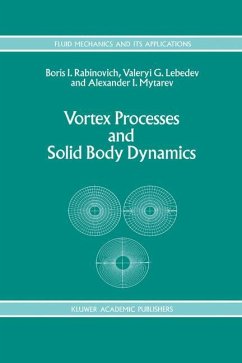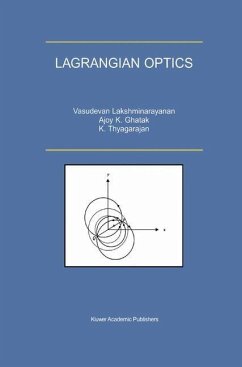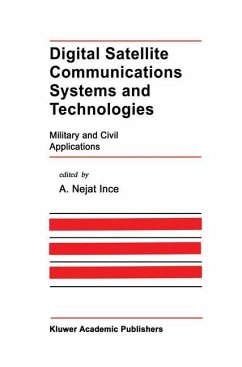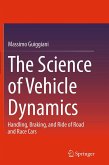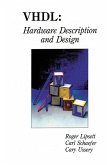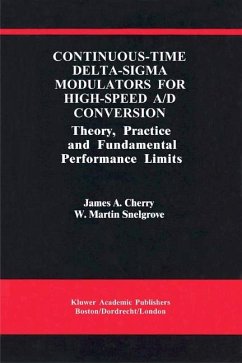B. Rabinovich, A. I. Lebedev, A. I. MytarevThe Dynamic Problems of Spacecrafts and Magnetic Levitation Systems
Vortex Processes and Solid Body Dynamics
The Dynamic Problems of Spacecrafts and Magnetic Levitation Systems
Übersetzung:Leviant, A. S.
B. Rabinovich, A. I. Lebedev, A. I. MytarevThe Dynamic Problems of Spacecrafts and Magnetic Levitation Systems
Vortex Processes and Solid Body Dynamics
The Dynamic Problems of Spacecrafts and Magnetic Levitation Systems
Übersetzung:Leviant, A. S.
- Broschiertes Buch
- Merkliste
- Auf die Merkliste
- Bewerten Bewerten
- Teilen
- Produkt teilen
- Produkterinnerung
- Produkterinnerung
... a wise man knows all things in a manner in which this is possible, not, however, knowing them individually. Aristotle. Metaphysics _ The problem of consideration of vortex fields' influence on solid body dynamics has a long history. One constantly comes upon it in flight dynamics of airplanes, helicopters, and other flying vehicles (FV) moving in the atmosphere, in dynamics of ships with hydrofoils, and in dynamics of rocket carriers (RC) and spacecrafts (SC) with liquid-propellant rocket engines (LPRE), that are equipped with special damping devices and other structural elements inside…mehr
Andere Kunden interessierten sich auch für
![Lagrangian Optics Lagrangian Optics]() V. LakshminarayananLagrangian Optics77,99 €
V. LakshminarayananLagrangian Optics77,99 €![Digital Satellite Communications Systems and Technologies Digital Satellite Communications Systems and Technologies]() Digital Satellite Communications Systems and Technologies266,99 €
Digital Satellite Communications Systems and Technologies266,99 €![Vehicle Dynamics and Control Vehicle Dynamics and Control]() Rajesh RajamaniVehicle Dynamics and Control154,99 €
Rajesh RajamaniVehicle Dynamics and Control154,99 €![The Science of Vehicle Dynamics The Science of Vehicle Dynamics]() Massimo GuiggianiThe Science of Vehicle Dynamics94,99 €
Massimo GuiggianiThe Science of Vehicle Dynamics94,99 €![VHDL: Hardware Description and Design VHDL: Hardware Description and Design]() Roger LipsettVHDL: Hardware Description and Design121,99 €
Roger LipsettVHDL: Hardware Description and Design121,99 €![The Automotive Chassis The Automotive Chassis]() Giancarlo GentaThe Automotive Chassis39,99 €
Giancarlo GentaThe Automotive Chassis39,99 €![Continuous-Time Delta-Sigma Modulators for High-Speed A/D Conversion Continuous-Time Delta-Sigma Modulators for High-Speed A/D Conversion]() James A. CherryContinuous-Time Delta-Sigma Modulators for High-Speed A/D Conversion154,99 €
James A. CherryContinuous-Time Delta-Sigma Modulators for High-Speed A/D Conversion154,99 €-
-
-
... a wise man knows all things in a manner in which this is possible, not, however, knowing them individually. Aristotle. Metaphysics _ The problem of consideration of vortex fields' influence on solid body dynamics has a long history. One constantly comes upon it in flight dynamics of airplanes, helicopters, and other flying vehicles (FV) moving in the atmosphere, in dynamics of ships with hydrofoils, and in dynamics of rocket carriers (RC) and spacecrafts (SC) with liquid-propellant rocket engines (LPRE), that are equipped with special damping devices and other structural elements inside fluid tanks. Similar problems occur when solving problems related to attitude control and stabilization of artificial Earth satellites (AES) and spacecrafts with magnetic (electro magnetic) systems, in conducting elements of which eddy currents are induced while control of those vehicles' angular position. It is also true with special test facilities for dynamic testing of space vehicles and their systems, with modern high-speed magnetic suspension transport systems (those based on the phenomenon of 'magnetic levitation'), with generators having rotors carried in 'magnetic bearings', and so on.
Produktdetails
- Produktdetails
- Fluid Mechanics and Its Applications 25
- Verlag: Springer / Springer Netherlands
- Artikelnr. des Verlages: 978-94-010-4452-3
- Softcover reprint of the original 1st ed. 1994
- Seitenzahl: 316
- Erscheinungstermin: 5. Oktober 2012
- Englisch
- Abmessung: 240mm x 160mm x 18mm
- Gewicht: 508g
- ISBN-13: 9789401044523
- ISBN-10: 940104452X
- Artikelnr.: 39916669
- Herstellerkennzeichnung Die Herstellerinformationen sind derzeit nicht verfügbar.
- Fluid Mechanics and Its Applications 25
- Verlag: Springer / Springer Netherlands
- Artikelnr. des Verlages: 978-94-010-4452-3
- Softcover reprint of the original 1st ed. 1994
- Seitenzahl: 316
- Erscheinungstermin: 5. Oktober 2012
- Englisch
- Abmessung: 240mm x 160mm x 18mm
- Gewicht: 508g
- ISBN-13: 9789401044523
- ISBN-10: 940104452X
- Artikelnr.: 39916669
- Herstellerkennzeichnung Die Herstellerinformationen sind derzeit nicht verfügbar.
1. Mathematical Models of Electrical Conductivity Ferromagnetic Elements with Eddy Currents.- 1.1. Statements of the Problem.- 1.2. Asymptotic Solution of Unsteady Boundary-Value Problems for Magnetic and Electrical Fields.- 1.3. Eddy Currents Mathematical Model.- 1.4. General Equations of System Dynamics with External and Eddy Currents and Mechanical Degrees of Freedom.- 1.5. Mathematical Models of Stabilized Ferromagnetic Elements as Objects of Control.- 1.6. Mathematical Models of the Electromagnetic Levitation System Actuator.- 2. Mathematical Models of Stabilazed Objects with Compartments Containing Vortex Low-Viscous Liquid.- 2.1. Mathematical Models of a Solid Body with Cavity Partially Filled with Ideal Liquid.- 2.2. Velocity Field of LV Liquid Vortex Motion in a Moving Cavity.- 2.3. Generalized Forces and Derivatives of Liquid Kinetic Energy with Respect to Generalized Velocities.- 2.4. The Mathematical Model of a Solid Body with a Cavity Containing Vortex Low-Viscous Liquid.- 2.5. Axially Symmetric Body. Particular Cases of General Equations of Perturbed Motion.- 2.6. Axisymmetric Body. Coefficients Conversion Formulae.- 2.7. Axisymmetric Body. Derivation of Equations of the Body - Liquid System Perturbed Motion from the Variational Principle.- 2.8. Spacecraft with LPRE Stabilized Attitude.- 2.9. Spacecraft with LPRE, Slowly Rotating around Its Longitudial Axis.- 2.10. Determination of Hydrodynamic Coefficients.- 3. Analytical and Numerical Methods of Dynamics Investigation of Vehicles Described by Vortex Models.- 3.1. Preliminary Remarcs.- 3.2. Analytical Methods of Investigation. Harmonic Balance Method.- 3.3. An Algorithm for Numerical Solution of a Set of Integrodifferential Equations with a Singular Kernel of the Type (t ? ?)??2.- 3.4.Methodological Example.- 4. Experimental Verification of Mathematical Models for Eddy Currents and Vortex Motions of Liquid.- 4.1. Mathematical Models Used for Experimental Data Processing.- 4.2. Determination of Mathematical Model Parameters Based on Experimental Results.- 4.3. Scheme of the Experiment and Primary Processing of Results.- 4.4. Verification of Models for Eddy Currents in HECF Elements.- 4.5. Low-Viscous Liquid Vortex Motions Model Verification.- 5. Some Dynamics Problems for Systems with Electromagnetic Actuators.- 5.1. Characteristic Properties of Electromagnet as an Object of Control. Requirements to the Air Gap Regulation System.- 5.2. Mathematical Model of the Two-Mass System 'Controlled Electromagnet - Mass with Elasto-Viscous Suspension'.- 5.3. Measurements Composition Influence on Required Completeness of Controlled Electromagnet Mathematical Model.- 5.4. Eddy Currents Influence on Closed-Loop System Dynamics. Reduction of Integrodifferential Equations to an Equivalent Set of Differential Equations.- 6. Some Dynamics Problems for a Spacecrafts Having Compartments Partially Filled with Liquid.- 6.1. Stabilizability and Dynamic Stability of Spacecrafts Having Compartments Partially Filled with Liquid.- 6.2. Simplified Mathematical Models of Perturbed Motion for a Spacecraft Having Compartments Partially Filled with Liquid.- 6.3. Self-Sustained Oscillations in the Closed-Loop System 'Spacecraft - Liquid - Controller'.- 6.4. SC Stability in the Yaw Plane with Account of Potential and Vortex Motions of Liquid in Tanks.- 6.5. SC Stability in the Roll Plane for Non-Small Amplitudes of Angular Oscillations.- 7. Examples of Control Law Synthesis for an Object Described by a Vortex Model.- 7.1. A Control Law Allowing Hardware Implementation,Based on Air Gap Sensor and Current Transducer Indications.- 7.2. Synthesis of a Relay-Controller Closed-Loop System.- 7.3. Mathematical Modelling of Electromagnetic Levitation System Dynamics.- 8. Some Dynamics Problems for a Solid Body with Electrically Conductive Liquid Moving in Magnetic Field.- 8.1. Statements of the Problem. Main Assumptions.- 8.2. Magnetic Hydrodynamics Boundary-Value Problems for LVECF Liquid.- 8.3. Liquid - Magnetic Field System Kinetic Energy. Generalized Forces and Generalized Voltages.- 8.4. Equations of Dynamics for a Solid Body Containing LVECF Liquid with Related Magnetic Field Presence.- 8.5. Equations of Dynamics for a Solid Body with a Cavity of Revolution Having Narrow Internal Ribs.- 8.6. The Case of a Circular Cylinder-Shaped Cavity.- 8.7. Magnetic Field Influence on Solid Body - LVEC Liquid Open-Loop System Frequency Response.- 8.8. The Possibility of Using Magnetohydrodynamic Effects to Ensure Dynamic Stability of Spacecraft.- Conclusion.
1. Mathematical Models of Electrical Conductivity Ferromagnetic Elements with Eddy Currents.- 1.1. Statements of the Problem.- 1.2. Asymptotic Solution of Unsteady Boundary-Value Problems for Magnetic and Electrical Fields.- 1.3. Eddy Currents Mathematical Model.- 1.4. General Equations of System Dynamics with External and Eddy Currents and Mechanical Degrees of Freedom.- 1.5. Mathematical Models of Stabilized Ferromagnetic Elements as Objects of Control.- 1.6. Mathematical Models of the Electromagnetic Levitation System Actuator.- 2. Mathematical Models of Stabilazed Objects with Compartments Containing Vortex Low-Viscous Liquid.- 2.1. Mathematical Models of a Solid Body with Cavity Partially Filled with Ideal Liquid.- 2.2. Velocity Field of LV Liquid Vortex Motion in a Moving Cavity.- 2.3. Generalized Forces and Derivatives of Liquid Kinetic Energy with Respect to Generalized Velocities.- 2.4. The Mathematical Model of a Solid Body with a Cavity Containing Vortex Low-Viscous Liquid.- 2.5. Axially Symmetric Body. Particular Cases of General Equations of Perturbed Motion.- 2.6. Axisymmetric Body. Coefficients Conversion Formulae.- 2.7. Axisymmetric Body. Derivation of Equations of the Body - Liquid System Perturbed Motion from the Variational Principle.- 2.8. Spacecraft with LPRE Stabilized Attitude.- 2.9. Spacecraft with LPRE, Slowly Rotating around Its Longitudial Axis.- 2.10. Determination of Hydrodynamic Coefficients.- 3. Analytical and Numerical Methods of Dynamics Investigation of Vehicles Described by Vortex Models.- 3.1. Preliminary Remarcs.- 3.2. Analytical Methods of Investigation. Harmonic Balance Method.- 3.3. An Algorithm for Numerical Solution of a Set of Integrodifferential Equations with a Singular Kernel of the Type (t ? ?)??2.- 3.4.Methodological Example.- 4. Experimental Verification of Mathematical Models for Eddy Currents and Vortex Motions of Liquid.- 4.1. Mathematical Models Used for Experimental Data Processing.- 4.2. Determination of Mathematical Model Parameters Based on Experimental Results.- 4.3. Scheme of the Experiment and Primary Processing of Results.- 4.4. Verification of Models for Eddy Currents in HECF Elements.- 4.5. Low-Viscous Liquid Vortex Motions Model Verification.- 5. Some Dynamics Problems for Systems with Electromagnetic Actuators.- 5.1. Characteristic Properties of Electromagnet as an Object of Control. Requirements to the Air Gap Regulation System.- 5.2. Mathematical Model of the Two-Mass System 'Controlled Electromagnet - Mass with Elasto-Viscous Suspension'.- 5.3. Measurements Composition Influence on Required Completeness of Controlled Electromagnet Mathematical Model.- 5.4. Eddy Currents Influence on Closed-Loop System Dynamics. Reduction of Integrodifferential Equations to an Equivalent Set of Differential Equations.- 6. Some Dynamics Problems for a Spacecrafts Having Compartments Partially Filled with Liquid.- 6.1. Stabilizability and Dynamic Stability of Spacecrafts Having Compartments Partially Filled with Liquid.- 6.2. Simplified Mathematical Models of Perturbed Motion for a Spacecraft Having Compartments Partially Filled with Liquid.- 6.3. Self-Sustained Oscillations in the Closed-Loop System 'Spacecraft - Liquid - Controller'.- 6.4. SC Stability in the Yaw Plane with Account of Potential and Vortex Motions of Liquid in Tanks.- 6.5. SC Stability in the Roll Plane for Non-Small Amplitudes of Angular Oscillations.- 7. Examples of Control Law Synthesis for an Object Described by a Vortex Model.- 7.1. A Control Law Allowing Hardware Implementation,Based on Air Gap Sensor and Current Transducer Indications.- 7.2. Synthesis of a Relay-Controller Closed-Loop System.- 7.3. Mathematical Modelling of Electromagnetic Levitation System Dynamics.- 8. Some Dynamics Problems for a Solid Body with Electrically Conductive Liquid Moving in Magnetic Field.- 8.1. Statements of the Problem. Main Assumptions.- 8.2. Magnetic Hydrodynamics Boundary-Value Problems for LVECF Liquid.- 8.3. Liquid - Magnetic Field System Kinetic Energy. Generalized Forces and Generalized Voltages.- 8.4. Equations of Dynamics for a Solid Body Containing LVECF Liquid with Related Magnetic Field Presence.- 8.5. Equations of Dynamics for a Solid Body with a Cavity of Revolution Having Narrow Internal Ribs.- 8.6. The Case of a Circular Cylinder-Shaped Cavity.- 8.7. Magnetic Field Influence on Solid Body - LVEC Liquid Open-Loop System Frequency Response.- 8.8. The Possibility of Using Magnetohydrodynamic Effects to Ensure Dynamic Stability of Spacecraft.- Conclusion.

